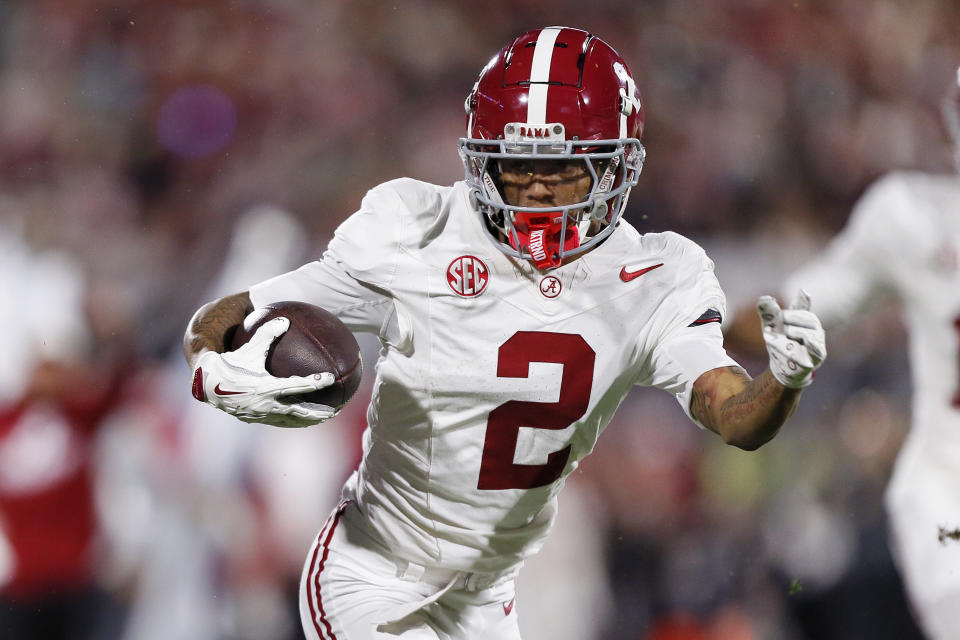Hundreds of college football players have signed group licensing agreements for their likeness to be used on video games in what is expected to be the single largest commercial deal in the industry’s history, eclipsing $20 million and, perhaps, touching more than hundred schools.
Pathway Sports and Entertainment, a new company focused on monetizing athlete NIL rights, is launching into the space by providing players with four-figure guarantees as part of video game NIL agreements, the company’s executives told Yahoo Sports this week. Pathway, guided by a three-member leadership team that includes former Altius and NFLPA executive Casey Schwab, has signed up more than 450 players at Alabama, Illinois, Georgia, Texas Tech, Wisconsin and Oregon.
Crimson Tide players on Monday were the first to strike the agreements during an informational event attended by players, athletic director Greg Byrne and head football coach Kalen DeBoer.
Several schools and players confirmed the meetings in statements to Yahoo Sports, including Alabama receiver Ryan Williams, who said Pathway is “helping us get our fair share of royalties from a billion dollar business driven by a video game that is loved around the world.”
As part of the agreement, each player is receiving $1,500 in an upfront payment, Schwab told Yahoo Sports. Royalty pay is also expected but that structure is yet to be determined.
The company has scheduled visits at other schools soon with intent to sign all of their players, including those at Clemson, West Virginia, Missouri and Tennessee. The goal is to sign each scholarship football player at the 134 FBS schools. That’s a total of about 11,000 players at a cost of more than $17 million in upfront payments, or about $125,000 per school.
However, that figure will likely exceed $20 million with a pool of millions set aside for “ambassador payments” to certain players.
The compensation is expected to be considered “outside NIL” and exempt from inclusion in the revenue-sharing cap that schools will soon be required to stay under as part of the impending athlete compensation system.
The deals, if executed across the country, represent a significant change in how players will sign away their video game likeness. Last year, in partnership with several service providers, EA Sports struck deals directly with players for an upfront payment of $600 each to appear in the return of the popular college football video game, “College Football 25.”
Though a small group of players received bonus payments, the $600 amounts were roundly criticized as low for a video game that generated more than $500 million in sales last year. Players received roughly 2% or less of that revenue.
With royalties, Pathway executives expect that athletes will make at least four times what most of them received last year.
“The overall vision is for athletes to make more money than we saw in the first year of the video game,” Schwab said. “We are creating mutual value here. This is a good thing for athletic directors, coaches and schools because they are trying to create legit opportunities for their players. These are legitimate.”
In the new athlete compensation system coming to college athletics, schools will be permitted to share millions of dollars with athletes annually in a capped revenue pool with built-in escalators. However, the compensation earned by athletes from outside NIL deals are excluded from the capped pool — a way that schools can legally exceed the amount of cash their players are receiving.
A new non-NCAA enforcement arm — detailed in a story at Yahoo Sports last week — will police the new payment system through a Deloitte-run NIL clearinghouse charged with determining that deals are genuine through fair market value standards.
The video game group licensing deal may serve as a blueprint for schools on how to generate more compensation for their athletes above the revenue-share cap. Already, NIL collectives are evolving into marketing agencies with the intent on creating real deals for athletes — “the new battlefield” in recruiting, according to one collective director.
Schwab has “no concerns” over the deals passing through college sports’ new NIL clearinghouse as Pathway is using “decades of data” to arrive at its payment amounts, he said.
Pathway has more campaigns coming. The company is focused on creating “above-the-cap” opportunities for athletes by “going through the front door” with schools and athletic directors, Schwab said. Rounding out the leadership team at Pathway is former Georgia collective director Matt Hibbs and Bob Philp, a veteran sports marketing executive with stops at CAA and Roc Nation.
Pathway agreed to send Yahoo Sports one of the licensing agreements that athletes are signing. The agreement promises to deliver to a school $175,000 in “legitimate, above cap marketing payments” for that school’s athletes. That figure includes $40,000 in additional “ambassador payments” to be mutually determined between Pathway and the school.
The agreement specifies that the payments are recurring annually so long as players remain in the Pathway program. For those athletes who advance to pro football, Pathway has the first option to license their NIL in connection with any pro video game, such as Madden NFL.
Pathway officials hold “deep relationships” with video game executives, Schwab said, and they will soon engage with them, but they are first focused on establishing deals with athletes. Schwab declined to reveal his financial investors, only saying that the company has “significant investors who believe in the vision.”
Source link
Read More
Visit Our Site
Read our previous article: Five teams poised to take a major fall in 2025: Vikings, Commanders appear primed for a drop-off
